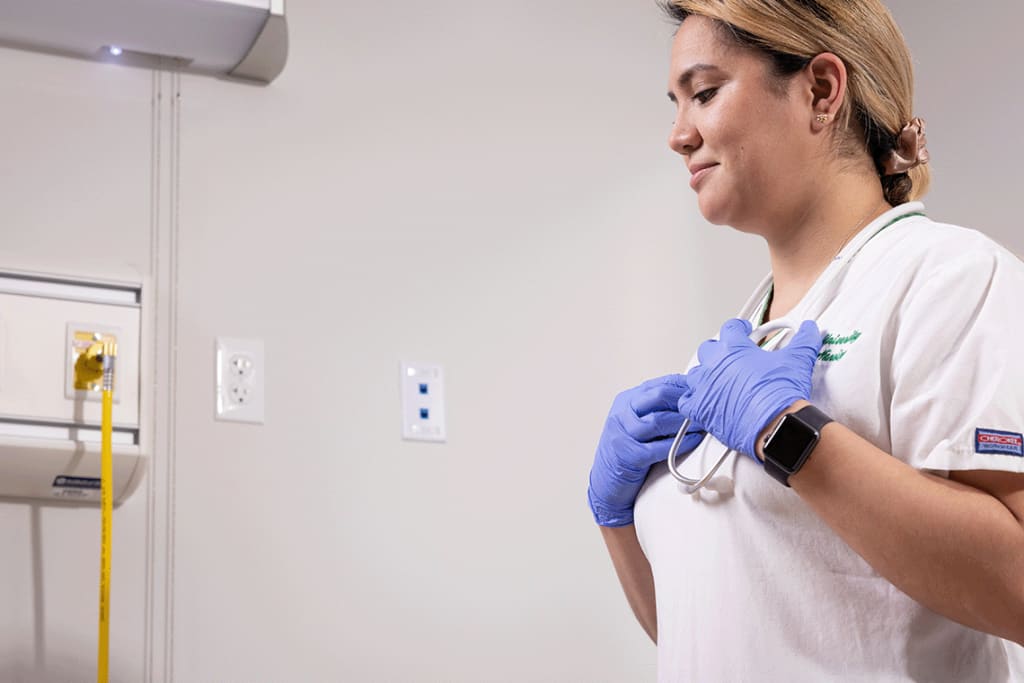Is Nursing School Worth It?
Each blog post is dated and contains accurate information as of that date. Certain information may have changed since the blog post publication date. If you would like to confirm the current accuracy of blog information, please visit our ABSN overview page or contact admissions at (844) 347-2497.
When looking at nursing programs, you might be wondering, “Is nursing school worth it?” Nursing school is an investment in your future. Learn some of the numerous benefits of nursing and why all your hard work in Felician University’s ABSN program will pay off.

If you are thinking about becoming a nurse, you likely have a lot of questions about the profession as well as the path to a degree. Is nursing school as hard as it seems? Is a nursing degree worth it? The good news is that if you have a passion and a drive to work as a nurse, your schooling will all be worth it. It will be challenging, but you can know that your hard work is an investment into a long and fulfilling career.
At Felician University, we want you to succeed both in school and out of school in your nursing career. With our Accelerated Bachelor of Science in Nursing (ABSN) program, you can complete nursing school in an accelerated timeline by pursuing either the 16-month online-based or 18-month on-ground ABSN program options.

Is online nursing school the right choice for you? Be prepared with this guide to online nursing education.
Why Choose a BSN
There are several options to choose from regarding your nursing education, from associate degrees through master’s or doctorate level. A common choice for many future nurses is to obtain a Bachelor of Science in Nursing (BSN) degree. If you are wondering, “is a BSN worth it,” this is an ideal choice because it opens up a world of opportunities.
Nurses with a BSN have a broader foundation of knowledge since this route is more expansive than an associates-level program. They also spend more time working in their clinical rotations in the hospital, making them more prepared to work in a clinical setting. In addition, hospitals are more incentivized than ever to hire nurses with a BSN with prominent initiatives like the drive to achieve Magnet status. Once you complete your BSN, you are eligible to apply for a master’s program as well.
Is Nursing a Good Career?
Nursing is, without a doubt, a challenging career, but it is also extremely rewarding. You will have opportunities to help people at their most vulnerable and provide comfort. It also doesn’t hurt that there are some additional benefits for you such as job security and opportunity for growth. Here are a few answers to the question, “is nursing a good career?”:
High Demand

As a nurse, you will not have to worry about job security. The need for nurses is constant, and if anything, has increased significantly in recent years. According to the World Health Organization, the number of people over the age of 80 will triple by 2050. This is one of the largest patient demographics, so this is anticipated to affect nursing drastically. As the older generation of nurses retire, the number of patients in need of care are increasing.
Many of our ABSN graduates find that obtaining a job as a nurse is not difficult. Through opportunities in clinical rotations and intentional networking, you will be prepared to apply for jobs and begin accepting offers. This high demand for nurses is an excellent incentive to motivate yourself throughout nursing school.
Salary
Nurses are well compensated for the hard work they put in every day. According to the Bureau of Labor Statistics, the mean annual wage for registered nurses nationally is $89,010 as of 2022. Not only is this an excellent salary, but there is ample opportunity to increase your income in the future. If you choose to go back to school for an MSN degree, for example, you can choose to work as a nurse practitioner who, on average, makes $123,780.
So if you are concerned about paying for nursing school, remember that this is a financial investment into your future. While you may have to keep a tighter budget during nursing school, it pays off after you graduate.
Nursing Shortage
Covid-19 took a heavy toll on the healthcare system, and this has revealed itself in the field of nursing in particular. It is projected that by 2031, the number of nurses nationally will grow by 195,400 from 2021 statistics. This increased need combined with the current nursing shortage has, and will continue to create challenging circumstances for healthcare workers and their patients.

This is where you come in. As a nurse, you can be a part of the change that is needed so badly. Nursing is an honorable profession that requires compassion and perseverance. If you are searching for a job where you will have an impact in the field and in people’s lives, nursing is just that. And you don’t need to wait to get your hands dirty. Because Felician’s ABSN program is on a shorter timeline, you will begin clinical rotations and work with patients earlier on.
Is Nursing School Right for You?
In an accelerated track, you’ll need to work harder, so it’s essential to be sure of your decision. Here are a few questions you should ask yourself to help you decide if nursing school is worth it for you.

To learn more about what life as a nurse is really like, explore these 8 pros and cons of nursing.
Are You Eligible for Accelerated Nursing School?
Felician offers both a 16-month hybrid program and an 18-month on-ground program, and to be eligible for either program, you’ll need to meet a few requirements. You’ll need at least 60 transferable college credits or a bachelor’s degree in a non-nursing field of study, a cumulative GPA of 3.0, and you will need to complete a series of prerequisite courses.
Do You Want to Take on the Stress of Nursing School?
As an ABSN student, you’ll face a whirlwind of coursework, nursing labs, clinical rotations, and proctored exams. Are you someone who can handle these stressful situations and look past them toward the goal? If so, you’ll likely see nursing school as a necessary part of your journey and be able to cope with the stress.

Does Nursing School Make Financial Sense?
Before deciding to go to nursing school, you may wonder if nursing school is worth it financially. The median annual salary for registered nurses in the U.S. is $75,330 as of May 2020, according to the U.S. Bureau of Labor Statistics. Paying for nursing school tuition is a major commitment, but it will pay off in the long run. Thankfully by making the investment in your education now, you’ll reap the benefits for decades in your career.
Does the Nursing Profession Play to Your Strengths?
The best nurses have certain traits and skills that make them good at what they do. By choosing a career that suits your strengths well, you’ll be happier and more fulfilled at work, making the career all the more worthwhile. Looking honestly at your strengths will help you see whether nursing will be a career in which you’ll personally thrive.
Why Choose Felician ABSN

Since a BSN is so important to your future as a nurse, an ABSN is a great way to jump into nursing as soon as possible and begin seeing the reward for all of your hard work in nursing school. At Felician University, you will have support every step of the way. Nursing school will be a challenge, but our team of dedicated instructors and your cohort will be there to help you get through.
So is nursing school worth it? Absolutely. Contact an admissions counselor today to learn if the ABSN program is the right fit for you.
